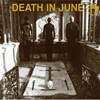 Among the most diverse entries in their catalog, Nada! is the sound of two very different individuals creating one distinct album. With the departure of Tony Wakeford, the band pretty much dropped the electric post-punk sound that characterized the earliest singles. What remains is about half acoustic ballads, and half gothic synth pop, but somehow feels like a coherent whole, and for me remains one of their best albums ever.
Among the most diverse entries in their catalog, Nada! is the sound of two very different individuals creating one distinct album. With the departure of Tony Wakeford, the band pretty much dropped the electric post-punk sound that characterized the earliest singles. What remains is about half acoustic ballads, and half gothic synth pop, but somehow feels like a coherent whole, and for me remains one of their best albums ever.
Personally I have never been too concerned with the pseudo-politics and politically incorrectness of the band, which is one of the reasons opinions on them is so decisive.For the most part, other than the militaristic rhythms and references to Klaus Barbie on "C'est un Reve," there’s not a whole lot of National Socialism to be found here, but a fair helping of nihilism and sadness abound.
The acoustic folk songs are, unsurprisingly, the ones courtesy of DIJ mainstay Douglas Pearce, the nascent sound that he would ram into the ground over the next 25 years, with diminishing returns.Here it’s not just a matter of it being fresh, there's also just a greater depth in arrangement and variety of songwriting.Songs like opener "The Honour of Silence" and "Behind the Rose (Fields of Rape)" remain among his strongest compositions, and have just the right amount of drama and bombast to accompany the guitar and vocals.
The classic "She Said Destroy," featuring David Tibet, continues this, leaning more into the pop realm than the other two, but losing none of the mystique.This is what makes this album stand out in the DIJ discography:the songs are catchy and memorable.For me, starting around The Wall of Sacrifice and continuing to the present day, too many of the songs since then simply disappear into the same mire of acoustic guitar and esoteric lyrics, mostly indiscernible from one to the other.Here each are distinct and powerful, never blurring into another track.
The other half of the album is mostly the work of Patrick Leagas, prior to forming Sixth Comm, and has a decidedly synth pop bent to it.Between the chintzy drum machines and rudimentary keyboards, it sounds very much a product of the era.For me, that’s not a problem at all, and it only adds to the quality of songs like "Rain of Despair," which sounds like nothing else the band has ever did with its almost dance-floor oriented drum programming and focus on rhythms more than vocals.
Even with these disparate approaches being used, there is a sense of unity that comes throughout:Leagas' "Foretold," while almost all programming and synths, has the same dark intensity that the folk tracks from Pearce specialize in.At the same time, the Pearce-sung "C'est un Reve" and "Crush My Love" also are far more synthetic than most of his work, yet still very much feel right.
For some reason, the earliest CD issue of this album via World Serpent tacked the bonus tracks to the beginning, while the more recent (and far superior) reissue via Tesco Organisation places them correctly at the end.A combination of B-sides and compilation tracks, to me they have always felt an essential piece of the album.The original version of "The Calling" appears here to balance its "Mark II" album take.Perhaps the best illustration of the dichotomy at play here, the original version relies mostly on Douglas' acoustic guitar playing, while the second version is all about the synths and sequences.
Also in dramatic contrast, the compilation track "The Torture Garden" is among the most avant garde of their early career, with its militaristic keyboards, Gregorian chants and drama infused vocals, which is nearly the polar opposite of "Born Again", a perfect little piece of synth pop that, in a more just world, would have been highly acclaimed upon release.
Like all of the reissued DIJ catalog, the Tesco-assisted reissue blows away the original, with much higher quality artwork and packaging, a quality mastering job, and an overall greater feeling of care in comparison, not to mention a much lower price tag.
Picking a favorite out of Death in June's early work isn't easy for me, because the holy trinity of this, The Guilty Have No Pride, and The World That Summer are all so different, yet brilliant in their own unique ways.Nada! would perhaps win by a hair, though it is a very close race.While Pearce seems to be content to follow a very formulaic approach to recording new work, while simultaneously reissuing mid-period albums in overpriced special packages with castoff tracks and re-recordings, it is work like Nada! that, to me, gives me hope with each new release, though disappointment almost always follows.
samples:
 
Read More


